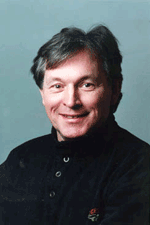> [Archived] Interviews

An Interview with the Composer Zygmunt Krauze
You are the messenger of Polish music and, at the same time, of European music at the 'International Week of New Music' Festival. I would like you to tell the Romanian audience about the main music trends in Poland nowadays. In Romania there are numerous trends: some composers try to reinvent the past, others remain loyal to experimenting. What is the situation in Poland?
I think that what is happening in Poland is also taking place everywhere else in the world. However, what I have noticed in the young generation of Polish composers is the tendency of going back to the avant-garde of the '60s and '70s, when the Polish school of composition was quite remarkable and the composers were trying to invent new sonorities, entirely original manners of notation or innovative forms. The current trend is the return to this avant-garde. There are, of course, other composers who write religious music, very simple or romantic music. But it is nice to listen to the works of young composers, to see their approach to music and the results they obtain with a lot of effort.
In your opinion, are there many differences between the contemporary music of Eastern Europe and that of Western Europe?
Every country, nation, society has its local colour. I can see the influence of Couperin, Lully, Ravel in French music. I recognize Brahms or Beethoven in German music. However, in the music of Eastern Europe emotion is stronger; composers attempt to touch the emotional side of people. In short, the focus is not on structure, but on feeling.
Another important event takes place in Bucharest today: the lecture you will give at the National University of Music Bucharest and the title of Doctor Honoris Causa they will grant you. What are the topics of your lecture? Provided they can be disclosed…
There is no secret…I will talk about the status of the composer nowadays, the commercialization composers are subjected to by the society. I will also talk about my relationship with Romanian music that goes back to the beginning of the '60s.
You are a composer, but also a pianist and tomorrow you'll be presenting at the concert hall of the Romanian Radio Broadcasting Corporation a concerto that you'll be interpreting yourself. I know that you also wrote concertos for other instruments. Which are these?
I did not compose so many concertos. I wrote three piano concerts; this is the first one, composed in 1976, and probably the most successful. I have played it approximately 18 times so far, everywhere in the world, but never in Romania. This will be the Romanian premiere of the concerto. I composed others for harpsichord, violin; I'm currently working on a concerto for accordion and on another for electronic instruments and orchestra, the latter inspired by an original idea.
You also composed operas. What were the sources of inspiration for your operas?
I composed five operas. Actually, opera has been my main preoccupation over the last ten years. Over the last four years I have composed three operas, commissioned by sundry theatres, but also a chamber work. The latter was honoured by the French Critics' Association as the best production of the previous season. The subjects of my five operas are based on plays written by Polish poets or writers, except one which is inspired by a play of the French classic Pierre Corneille, with the title Polieukt. It is this opera that brought me the award in France.
You have just rehearsed the piano concerto; can you describe it to us in a few words?
The originality of my Piano Concerto no. 1 resides in the presence of instruments that are not usually found in an orchestra: two accordions, three saxophones and two electric guitars. Another novelty is that the piano is played independently from the orchestra. Usually, musicians wish to be heard together, but in this case I wanted to give the pianist soloist the liberty to express himself; he will always be close to the orchestra, but they will never really play together.
What does it mean to be a composer of the 21st century? Do you see yourself as a composer of the 21st century?
I don't know… I'm just a composer who continues to write music from one century to the next and for me there are no differences between these two centuries. It's only an artificial dividing line, some simple dates. I believe that the development of music, art, society has nothing to do with time, but with the way we develop ourselves. I have never felt more alive, because I compose more than ever. I am very active in the 21st century on three levels: as composer, pianist and professor.
Translated by Mihaela Olinescu and Elena Daniela Radu
MTTLC, The University of Bucharest














